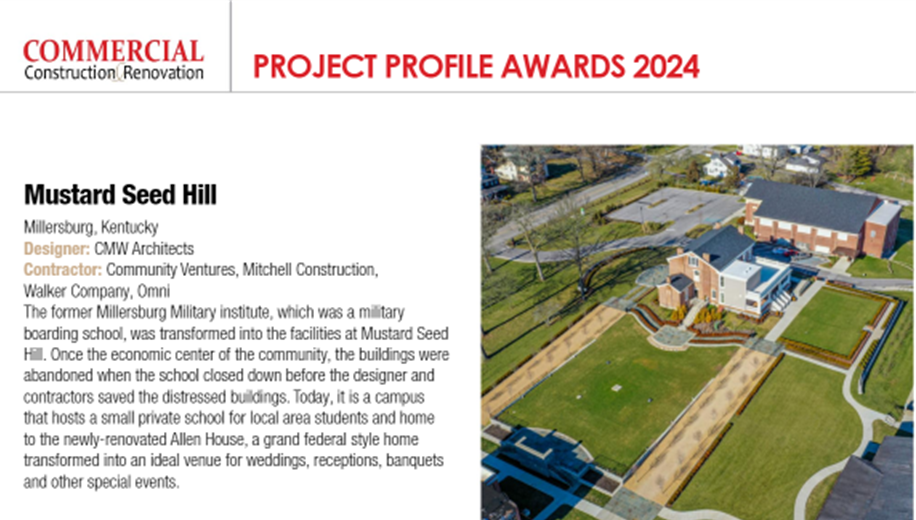Nearly three decades ago, a paper napkin and a few minutes was all Todd Ott needed to capture Community Ventures (CV) CEO Kevin Smith’s vision for the design of CV’s Lexington headquarters. When Smith met Ott, now a Senior Associate at CMW, a forward-thinking design firm specializing in architecture, engineering, interior design, and landscape, the CEO had been working with a different design firm for over a year.
“I ended up at a dinner with Todd, and explained to him what I was looking for,” remembers Smith. “Within fifteen minutes he had sketched the building out on a napkin. He showed it to me and asked, ‘Is this what you want?’. Todd had nailed it, and that began our long relationship with CMW. We get them, they get us and that makes the projects work.”
Flash-forward to 2024, and the work of CV and CMW at Mustard Seed Hill (MSH) captured the attention of Commercial Construction and Renovation (CCR) magazine. In the CCR May edition, MSH won the publication’s Project Profile Award for excellence in renovations and adaptive reuse solutions, shining a bright light on CMW’s accomplishments in rural Bourbon County.
Ott, a trained and licensed architect of 38 years, notes that CV had been developing a comprehensive plan for the stabilization of a dying town, and Millersburg ticked all the boxes. Ott was asked to come on board to help meet the goals of the model of economic stabilization.
By 2016, following failed attempts at revival by two other military-minded programs, the MMI campus had deteriorated into a collection of ramshackle buildings in various stages of decay. But word of the recovery effort was met with a mix of doubt and pushback by some Millersburg residents. And the skepticism was not unfounded, as locals had become jaded by the broken promises of campus tenants pre-dating CV.
One of those skeptics was Jo Hoover, the daughter of a military veteran who grew up on the outskirts of Millersburg. Hoover completed four years at MMI, advancing through the ranks to Battalion XO and graduating with the Class of ’87. Her love for the MMI campus has never faded.
“I was so disappointed in what had gone on there after MMI’s closure,” Hoover said. “When CV bought the property, I was terrified wondering if they would destroy it.”
Also dubious was lifelong Millersburg resident Penny Barbee, City Council member and next-door neighbor of the campus. Barbee remembers as a child walking downtown to get a hamburger, fries, and shake and attending ballgames and dances at MMI. But as Millersburg slipped into decline she knew something needed to change.
“Some homes were dilapidating and beginning to fall down,” Barbee explained. “The campus was being vandalized, windows broken out, people stripping out pipes and destroying the property. Animals were living in the abandoned buildings. We could see the raccoons going in and out.”
Still, Barbee says, when CV’s plan was presented to the City Council her initial thought was “Oh no. Here we go again.”
Debbie Jackson moved from Lexington to a house directly across the street just as work on the campus was beginning. Jackson’s husband had childhood memories of MMI cadets parading down Main St.
“We didn’t come here to change this town,” Jackson said. “We came to be a part of it and keep its spirit alive.” Also, a council member, she was aware of her neighbors’ concerns.
Smith understands their concerns. “We knew we had to be very careful as we waded in. Had we leveled buildings and built new ones, we would have destroyed all the memories that the community had of MMI, and what that institution meant to the town. Todd understood perfectly, and planned the reuse of the buildings so that when renovations were complete people would still recognize MMI as the place they loved.
“As far as creative reuse, we wanted to turn MSH into a destination place—something that people can’t see anywhere else. Todd had the vision to do that.”
Ott laughs, recalling his first visit to assess the scope of the MMI renovation project. “As a whole, it was a little scary and a bit like a ghost town. A few buildings were closer to being condemned than candidates for restoration.”
After identifying the former Millersburg Military Institute (MMI) as the economic engine that could get Millersburg back on track, CV and CMW determined to begin there as the starting point of the town’s recovery. The plan was to re-imagine the historic campus—now known as Mustard Seed Hill—as a multi-use destination and attraction.
The old MMI gymnasium had the best existing conditions and so was targeted for restoration first. As it was with all the buildings, the gymnasium had suffered years of neglect and abandonment, something Ott considers the worst thing that can happen to a structure. Lack of climate control and other upkeep, he says, can cause them to “deteriorate under their own gravity.”
Once recovered, the gymnasium building became home to the Bourbon Christian Academy, the first of MSH’s tenants.
Next up was the Allen House mansion, formerly serving as the MMI offices. Structurally, it was salvageable but had quickly degraded. It was extremely important to Ott to preserve the Allen House’s interior and exterior beauty and historic value while still enabling it to meet contemporary building codes. Much of that was accomplished by Ott’s seamless additions on the back of the building.
“Todd has gotten to know CV’s likes and dislikes so well,” Smith said. “But more than that, Todd has a flair for going beyond ‘good’ to ‘great’. His knack for that can be seen all over the campus.”
The completed Allen House now sits as the Grande Dame of MSH, resplendent in her beauty and, as Ott notes, an excellent example of adaptive reuse in its new role as an elegant wedding and event venue.
McIntyre Hall was technically beyond the state of condemnation. Formerly classrooms for MMI cadets—it was first stabilized and then transformed into a multi-purpose building featuring upscale B&B lodging, conference space, and a commercial kitchen now home to a popular bakery.
Hoover and Barbee both note a resurgence of pride in the townspeople since the opening of MSH. Barbee laughs, remembering her own change of heart. “I remember thinking ‘This is wonderful! I have been proven wrong, and I’ll eat every negative word I ever said.’” Jackson is equally optimistic. “It’s not a dead little town anymore. It’s a sweet little town with a lot of potential.”
Today, MSH is a destination, drawing nearly 100,000 visitors to Millersburg.
Thanks to the outstanding work and skills of Todd Ott and CMW, MSH won Commercial Construction & Renovation’s Project Profile Award for renovations and adaptive reuse solutions.
To learn more about MSH, visit https://www.mustardseedhill.events
For more information on CMW, click here, and to read the project profile on MSH, see page 90 of Commercial Construction & Renovation’s Issue 3 for 2024: https://issuu.com/bocdesigninc/docs/ccr-issue.3.24?fr=sNzg4MjYzMjg0NTY.


